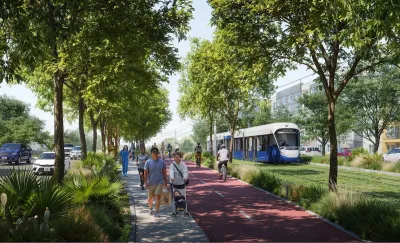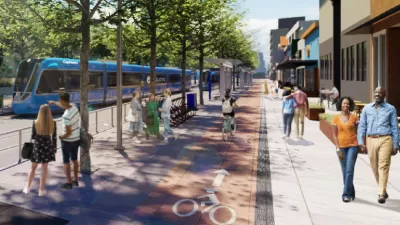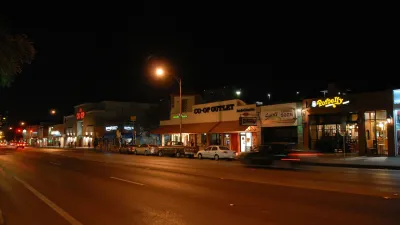The light rail project is moving ahead with plans to finalize its environmental impact review by late 2025.

Despite uncertainty about federal funding and state support, the light rail portion of Austin’s Project Connect is moving ahead, with the Austin Transit Partnership releasing its latest plan for the 9.8-mile transit line. However, as Benton Graham reports in Smart Cities Dive, “The project, which city voters approved in a referendum, faces potential funding and other challenges at the state and federal levels.” Last April, the Texas Attorney General filed a lawsuit against the project, claiming that voters did not approve a revised design.
The latest updates to the plan include an additional station near the state capitol downtown and a bridge over Lady Bird Lake with an elevated station. “The light rail line would have 15 stations that cut north-south through the city’s downtown and turn east after crossing Lady Bird Lake. It also lists priority extension stations further north, south and east, including to Austin Bergstrom International Airport, that it would pursue if funding were to become available.”
If it remains on track, the project could be completed by 2033. Although half of the project was to be financed by federal funding, ATP officials say federal funding freezes will not affect Project Connect’s 2025 timeline, which is funded through a $193 million budget approved in September consisting primarily of taxpayer dollars.
FULL STORY: Austin, Texas, light rail project advances amid political uncertainty

Maui's Vacation Rental Debate Turns Ugly
Verbal attacks, misinformation campaigns and fistfights plague a high-stakes debate to convert thousands of vacation rentals into long-term housing.

Planetizen Federal Action Tracker
A weekly monitor of how Trump’s orders and actions are impacting planners and planning in America.

San Francisco Suspends Traffic Calming Amidst Record Deaths
Citing “a challenging fiscal landscape,” the city will cease the program on the heels of 42 traffic deaths, including 24 pedestrians.

Defunct Pittsburgh Power Plant to Become Residential Tower
A decommissioned steam heat plant will be redeveloped into almost 100 affordable housing units.

Trump Prompts Restructuring of Transportation Research Board in “Unprecedented Overreach”
The TRB has eliminated more than half of its committees including those focused on climate, equity, and cities.

Amtrak Rolls Out New Orleans to Alabama “Mardi Gras” Train
The new service will operate morning and evening departures between Mobile and New Orleans.
Urban Design for Planners 1: Software Tools
This six-course series explores essential urban design concepts using open source software and equips planners with the tools they need to participate fully in the urban design process.
Planning for Universal Design
Learn the tools for implementing Universal Design in planning regulations.
Heyer Gruel & Associates PA
JM Goldson LLC
Custer County Colorado
City of Camden Redevelopment Agency
City of Astoria
Transportation Research & Education Center (TREC) at Portland State University
Jefferson Parish Government
Camden Redevelopment Agency
City of Claremont





























